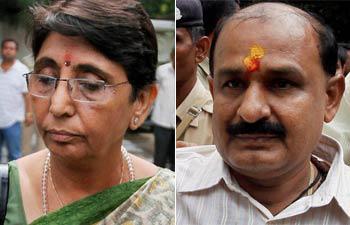
Ahmedabad, August 31: Maya Kodnani, BJP MLA and former minister in the Narendra Modi government, was on Friday sentenced to 28 years in jail for her involvement in the 2002 post-Godhra Naroda Patiya riots case.
Former Bajrang Dal leader Babu Bajrangi, who was also convicted in the case, has been awarded life imprisonment till death.
The remaining 30 convicts were also awarded life term by a special court here.
Kodnani would serve the jail term under different Sections of the IPC; 10 years under Section 326 and 18 years under Sections 120 (B)(criminal conspiracy), 302 (murder) and 307 (attempt to murder).
Special court judge Jyotsana Yagnik had however acquitted 29 accused in the case in which 97 people belonging to the minority community were killed.
Kodnani, a three-time MLA from Naroda area, who was considered to be close to Chief Minister Narendra Modi, is the first woman and first MLA to be convicted in a post-Godhra riots case.
Kodnani and Bajrangi were held guilty under Sections 120 (B)(criminal conspiracy), 302 (murder) and 307 (attempt to murder) of IPC and the prosecution had sought the maximum punishment of death sentence for all the convicts.
On Wednesday, during the arguments on the quantum of sentence, lawyers of Kodnani and other convicts had sought leniency from the court.
Among the 2002 riots cases probed by the Special Investigation Team (SIT) in which rulings have come, Naroda is the only case where convicts (32) outnumber those acquitted (29).
In the Godhra train carnage case, court had convicted 31 and acquitted 63. In Sardarpura case, court had convicted 31 and acquitted 42, while in Dipda Darwaja case 22 had been convicted and 61 acquitted.





Comments
Add new comment